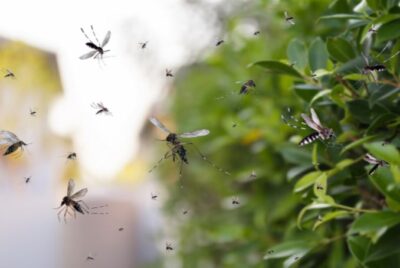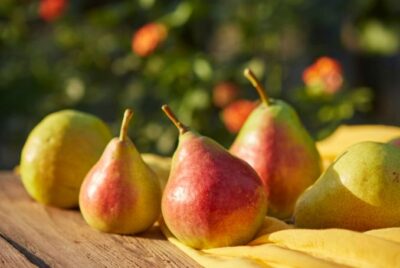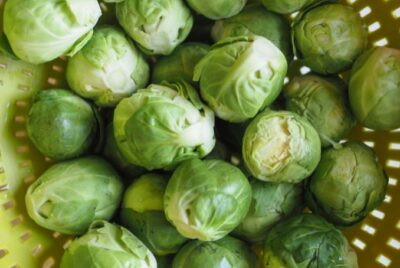Can Chickens Eat Potato Skins? Benefits and Risks Explained
If you keep chickens, you might wonder if it’s okay to throw those leftover potato skins into their coop. After all, it feels good not to waste food, and those skins could be a tasty snack for your flock, right? But wait – is it actually safe? You may have heard mixed messages about whether chickens can eat potato skins without issues.
The truth is, while potato skins can be a decent treat, they can also carry a hidden danger. Let’s break down what’s really important for your chickens’ health and get to the bottom of this potato peel puzzle. We’ll ensure you have all the straightforward facts to feed your chickens without worry.
Is It Safe for Chickens to Eat Potato Skins?
Yes, chickens can eat potato skins, but it’s important to ensure they are safe for consumption. First, the concern with potato skins is all about a toxin called solanine. It’s naturally present in potatoes, especially when they’re exposed to too much light and start turning green.
This green coloration is a tell-tale sign that solanine levels are high, and that’s when you don’t want to give those skins to your chickens. Solanine can be very harmful to them, and I avoid it at all costs for the safety of my flock.
Now, you might wonder, do I ever feed my chickens potato skins? The answer is, sometimes. But only when I’m absolutely sure that there’s no green coloration on the peels. The white or yellow skins from healthy-looking potatoes are safe, and I’ve fed these to my chickens without any issues. They seem to enjoy the treat, and it’s a good way to reduce waste.
Even with non-green potato skins that are safe, I feed them sparingly, mixed with other food scraps to ensure my chickens are getting a varied and balanced diet. This way, I know they’re getting their nutrients from multiple sources, and the risk of eating something they shouldn’t is minimized.
Yes, I do feed my chickens potato skins on occasion, but only when I’m confident that the peels are free from solanine. It’s one of those times when being extra cautious really matters, because the health of my chickens is my top priority.
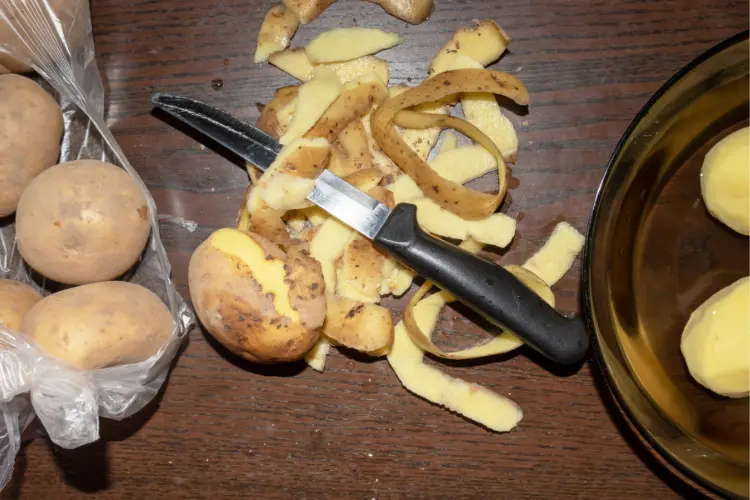
Understanding the Dangers of Solanine in Chickens
What Is Solanine?
Solanine is a natural toxin found in the nightshade family, which includes tomatoes and potatoes, and it’s particularly concentrated in the green parts such as leaves, unripe fruit, and the eyes and skin of potatoes.
It acts as a pesticide and fungicide within the plant, which is great for the potato but not so much for your flock. When feeding scraps, solanine’s presence necessitates a cautious approach because it can lurk in the seemingly harmless potato peels you might consider giving to your chickens.
What Are the Risks of Solanine to Chickens?
The risks that solanine poses to your chickens are not to be taken lightly. Ingesting solanine can lead to symptoms such as upset stomach, weakness, and in severe cases, could escalate to respiratory problems or fatality.
Recognizing these symptoms early can be a lifesaver for your flock if they ever consume solanine accidentally.
How to Reduce the Risk of Solanine Poisoning
To minimize the risk of solanine poisoning in your chickens, you should ensure that any potato skins you feed them are completely green-free and ideally cooked, as heat can reduce the solanine content.
However, it won’t completely remove it, so your safest bet is to keep such treats scarce. Regularly changing up their diet and keeping a close eye on any treats that come from the nightshade family will help keep your chickens safe from the hidden dangers of solanine.
Can Chickens Eat Raw Potatoes?
Chickens should not eat green potatoes or sprouted raw potato peelings due to the presence of solanine, a toxin that can be harmful to them.
While yellow or white potatoes that aren’t green could technically be eaten by chickens, it is generally safer to avoid feeding raw potatoes altogether to prevent any risk of solanine poisoning. So I won’t let my chickens eat raw potato peels at all costs for the safety of my flock
Instead, consider offering cooked potato skins as a treat alongside their regular feed and other table scraps.
Can Chickens Eat Sweet Potatoes?
Yes, chickens can eat sweet potatoes, and they are generally safe because they contain lower levels of solanine. You can feed them both the flesh and the skins of sweet potatoes. However, as with all treats, they should be given in moderation as part of a balanced diet.
Can Chickens Eat Boiled Potatoes?
Boiled potatoes are safe for chickens as the cooking process significantly reduces the solanine content. Ensure they are plain, without added salt, butter, or seasoning, as these can be unhealthy for chickens. Cooked potatoes can be a source of carbohydrates for chickens, but again, should be offered in moderation alongside their regular feed.
Read also: What Do Chickens Eat – 201 things on our list
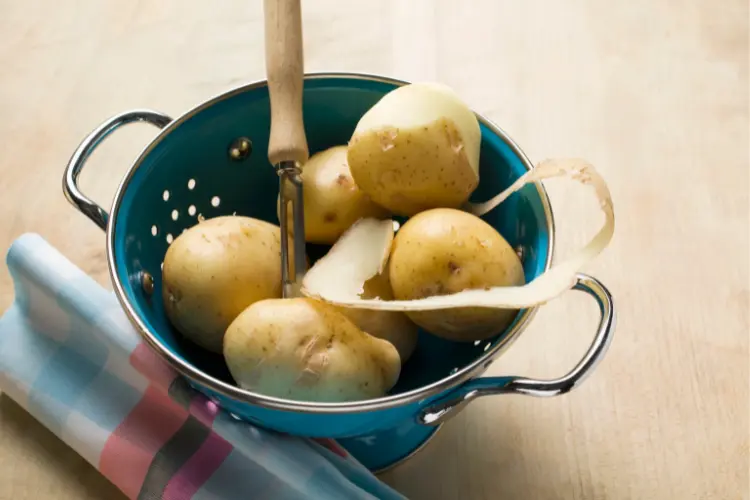
Safe Alternatives to Potato Peels
- Cooked Rice or Pasta: These are great sources of carbohydrates. Just make sure they’re plain and have no sauces or seasonings.
- Leafy Greens: Spinach, kale, and lettuce are excellent for chickens. They’re full of nutrients and can help with the chickens’ digestion.
- Cooked Beans: Never raw, as raw beans can be toxic to chickens. Cooking beans thoroughly removes this risk.
- Cabbage: A whole cabbage hung up in the coop can also serve as an entertaining pecking toy.
- Winter Squash and Pumpkin: Seeds and flesh are both safe and healthy for chickens, and they love pecking at them.
- Cucumbers and Zucchinis: These vegetables are low in calories and can provide hydration and nutrients.
- Carrots: Both raw and cooked carrots are enjoyed by chickens, and they can eat the tops as well.
- Herbs: Many herbs such as parsley, oregano, and basil are safe for chickens and can also promote better health.
- Peas: Chickens often enjoy both the peas and the pods, and these can be given raw or cooked.
- Grains: Whole grains like wheat, barley, and oats are healthy for chickens in moderation.
Read also: Best Plants to Grow as Chicken Feed Alternatives
What Are the Nutritional Benefits of Potato Peels to Chickens?
Potato peels can offer several nutritional benefits to chickens when fed correctly and safely:
Energy Source from Carbohydrates
Potato skins contain carbohydrates that are primarily in the form of starch. When the chickens consume the peels, their bodies break down the starch into glucose, which is a vital source of energy. This energy is critical for their daily activities, growth, and egg production.
Protein for Growth and Repair
While not as protein-rich as other food sources, potato peels do contain small amounts of protein. These proteins are broken into amino acids by the chickens’ digestive system and are essential for muscle and organ repair and growth, feather production, and general bodily functions.
Essential Minerals
Potato peels are a good source of several essential minerals that play important roles in a chicken’s body. Iron in the peels helps form hemoglobin, which is good for oxygen transport in the blood.
Potassium is key for muscle contraction and heart function, ensuring chickens maintain a regular heartbeat. Magnesium can regulate blood pressure and is necessary for proper nerve function and the transmission of nerve impulses.
Vitamins for Overall Health
The vitamins present in potato peels are numerous and provide a range of health benefits. Vitamins such as B-1 (thiamin) support glucose metabolism and are crucial for the normal function of nerves, muscles, and the heart.
Vitamin B-3 (niacin) is involved in energy production and hormonal synthesis. Vitamin B-6 plays a role in metabolism, the central nervous system, and the production of neurotransmitters which affect mood.
Additionally, vitamin C acts as an antioxidant, potentially reducing inflammation and preventing cellular damage, contributing to the overall resilience and health of the chickens.
Fiber for Digestive Health
Fiber in potato peels can be beneficial for the digestive health of chickens. The soluble fiber present can be fermented in the gut and turned into a source of energy, while insoluble fiber helps to bulk up the digestive contents, aiding in the smooth passage and helping to prevent issues like constipation. Fiber also maintains a healthy gut microbiome, which is good for the optimal digestion and absorption of nutrients.
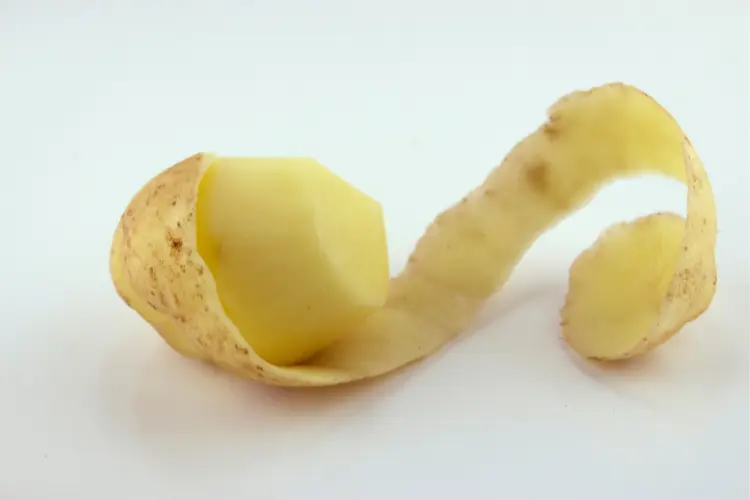
So Can Chickens Eat Potato Peels?
Potato peelings can be a nutritious addition to your chickens’ diet when carefully handled. It’s crucial to avoid feeding them any green or sprouted peels, as these can contain the toxic compound solanine.
Moderation is key, as with any treats, to ensure your chickens stay healthy and happy. While potato skins can be a tasty snack, remember that they should complement, not replace, a well-rounded chicken diet.
By following these guidelines, you can provide your feathered friends with a safe and enjoyable culinary experience while safeguarding their health.


